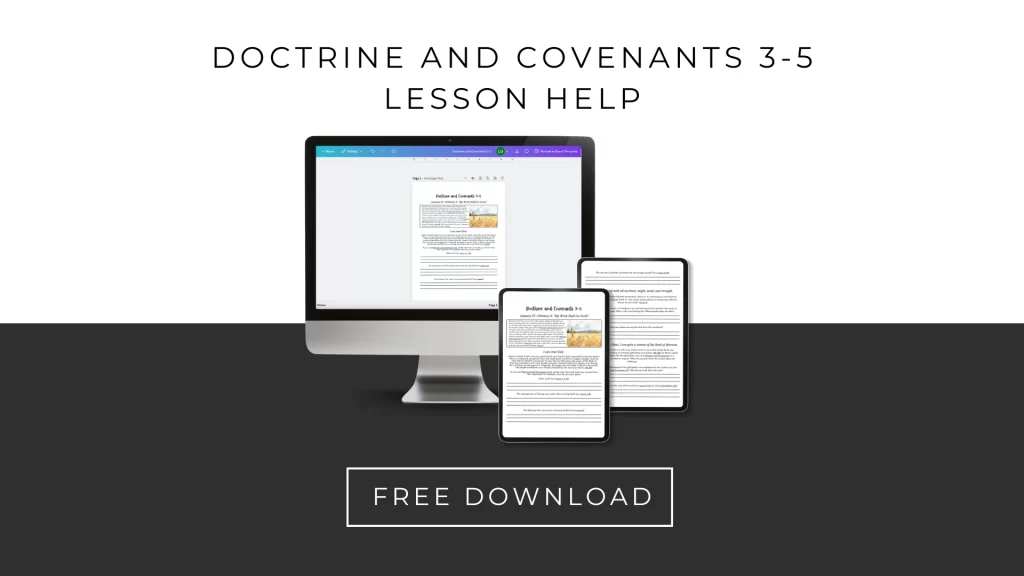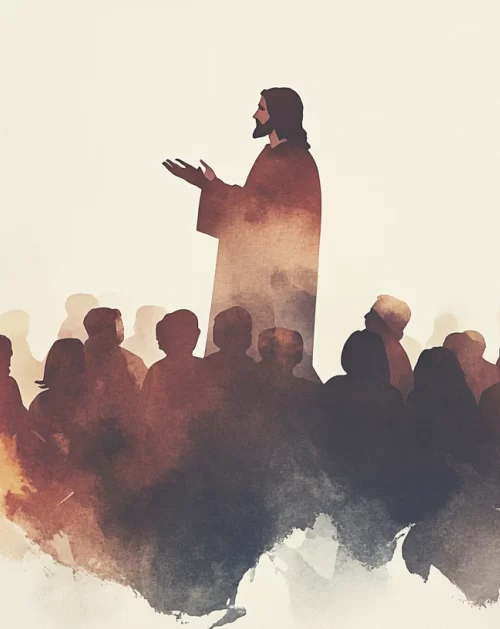
In this article, weʻll be deep diving into Doctrine and Covenants 3–5. To download our free lesson help + customizable Canva Template, click here: https://otherthanamom.myflodesk.com/dandc3-5

I can trust God.
Engaging Questions:
- What do you learn from Doctrine and Covenants 3:1–3, 16 about the Lord’s work and how it cannot be stopped? How does this bring you peace?
- Why do you think Joseph struggled to trust the Lord’s initial warning about not sharing the manuscript pages? What can we learn from his experience?
- What lessons do verses 4–8 teach about the consequences of fearing man more than God? Have you ever experienced something similar in your life?
- How does verse 8 show the blessings of remaining faithful and trusting God? How have you seen these blessings in your life?
- The Lord corrected Joseph but also encouraged him in verses 9–16. What does this teach you about how God disciplines and supports us?
- Have you ever faced a situation where you had to choose between trusting God or yielding to the pressures of others? What did you learn from that experience?
- How does understanding God’s mercy (as shown in His response to Joseph) help you feel confident in seeking forgiveness when you make mistakes?
- What examples from Elder Lynn G. Robbins’s talk or other scriptures inspire you to trust God over man?
- Why do you think it’s sometimes hard to trust God fully? What can you do to strengthen your trust in Him?
- What steps can you take this week to prioritize God’s will in your decisions, even when faced with pressure or uncertainty?
Object Lessons:
1. The Tug-of-War Rope (Trusting God vs. Fearing Man)
Materials Needed: A rope or a long piece of string.
Hold a brief tug-of-war with two people or groups, symbolizing the tension between trusting God and fearing man. Discuss how pulling in the direction of “fearing man” weakens us spiritually, while choosing to trust God aligns us with His strength and guidance.
Lesson: Trusting God allows us to overcome the pull of worldly pressures and stay firm in His path.
2. The Compass (God’s Steady Direction)
Materials Needed: A compass.
Show the compass and explain how it always points north, providing consistent direction no matter the circumstances. Compare this to God’s guidance, which is unchanging and reliable. When we trust Him, we avoid getting lost in the confusion of worldly opinions.
Lesson: God’s work is steady and sure, and trusting His direction leads to safety and peace.
3. The Domino Effect (Consequences of Choices)
Materials Needed: Dominoes.
Set up a line of dominoes and explain how one small choice can create a chain reaction. Tip the first domino to demonstrate the consequences. Discuss how fearing man, like Joseph and Martin in this instance, caused a ripple effect of challenges, while trusting God avoids negative outcomes.
Lesson: Our choices have consequences, but trusting God helps us avoid spiritual setbacks and ensures we stay aligned with His plan.
4. The Safety Net (God’s Mercy and Correction)
Materials Needed: A net or a picture of one.
Show the net and explain how it provides safety for someone falling. Compare this to how God corrected and encouraged Joseph after the loss of the 116 pages. Even when we make mistakes, God lovingly provides a way to recover and continue in His work.
Lesson: God corrects us to help us grow, but He also provides encouragement and a path forward.
5. The Lantern (Light in Difficult Decisions)
Materials Needed: A lantern or flashlight.
Turn on the light and explain how it helps us see clearly in the dark. Compare this to trusting God when faced with tough decisions. His guidance illuminates the right path, even when it’s hard to see the outcome.
Lesson: Trusting God is like following a lantern in the darkness; it helps us avoid danger and find our way safely.
Personal Sharing Prompts:
- Think of a time when you felt torn between trusting God’s guidance and following what others wanted you to do. How did you find the courage to trust God, and what were the results?
- Think of a time when you faced the consequences of choosing to please others rather than obeying God. How did that experience help you learn to trust Him more fully?
- Think of a time when you were corrected by the Lord or felt chastened through the Spirit. How did that experience help you grow and strengthen your faith in God’s mercy and wisdom?
- Think of a time when you trusted God’s timing, even when it was hard to be patient. How did that decision bless your life or the lives of others?
- Think of a time when you felt the Lord’s encouragement after making a mistake. How did His reassurance help you continue forward with faith?
- Think of a time when you chose to remain faithful to a commandment, even under pressure to do otherwise. How did the blessings from that decision strengthen your trust in God?
- Think of a time when you saw evidence of God’s work continuing despite human errors or setbacks. How did that experience reassure you of His power and purpose?
- Think of a time when you prayed for guidance and received a clear answer from the Lord. How did acting on that answer deepen your trust in Him?
- Think of a time when you felt supported by God during a difficult trial or decision. How did that experience help you trust Him in future challenges?
- Think of a time when you felt inspired by someone else’s example of trusting God, even in difficult circumstances. How did their faith influence your own choices?
I can serve God with all my heart, might, mind, and strength.
Engaging Questions:
- What qualities and attributes does the Lord describe in Doctrine and Covenants 4 as necessary to serve Him? Which of these do you feel you’re developing?
- How can someone who is not a full-time missionary, like Joseph Smith Sr., serve God with all their heart, might, mind, and strength?
- What does it mean to you to have “desires to serve God”? How have these desires influenced your actions?
- What are some benefits or blessings the Lord promises to those who serve Him, as described in Doctrine and Covenants 4?
- President Nelson called the gathering of Israel “the greatest work on earth.” What part of this work excites or inspires you the most? Why?
- How can you personally contribute to the gathering of Israel in your family, community, or online?
- What challenges might prevent someone from serving God with all their heart, might, mind, and strength? How can these challenges be overcome?
- What experiences have you had where you felt joy or fulfillment from serving God? How did those moments strengthen your testimony?
- How can you align your daily choices with the principles of service and dedication outlined in Doctrine and Covenants 4?
- What is one specific thing you can do this week to serve God more fully, whether in your family, Church, or community?
Object Lessons:
1. The Four-Part Rope (Using All of Ourselves to Serve God)
Materials Needed: Four pieces of string or yarn and a larger rope.
Twist the four pieces of string together to create a stronger rope. Explain that each strand represents heart, might, mind, and strength. Alone, each is limited, but together they are strong and effective. Discuss how serving God with all our heart (love), might (effort), mind (thought), and strength (action) allows us to contribute meaningfully to His work.
Lesson: Serving God with all aspects of ourselves makes us spiritually stronger and more effective in His service.
2. The Toolbox (Different Tools for Different Tasks)
Materials Needed: A toolbox with a variety of tools.
Show the toolbox and explain how each tool has a specific purpose but is part of the same mission. Compare this to serving God with our heart, might, mind, and strength: each “tool” is essential and contributes to the overall work. Emphasize that every person has unique talents and strengths to offer.
Lesson: God equips us with different abilities and expects us to use them wholeheartedly to serve Him.
3. The Lit Candle (Fully Committing to God’s Work)
Materials Needed: A candle and matches.
Light the candle and explain how the flame represents our devotion to God. A partially lit or flickering candle struggles to provide light, just as partial effort in God’s work limits our effectiveness. When we serve Him with all our heart, might, mind, and strength, we shine brightly and illuminate His work.
Lesson: Full commitment to God’s work allows His light to shine through us and bless others.
4. The Ladder (Step-by-Step Effort in Service)
Materials Needed: A small ladder or a picture of one.
Show the ladder and explain how climbing it requires effort and focus. Each rung can represent heart, might, mind, and strength. Discuss how serving God is a step-by-step process that involves dedicating all aspects of ourselves to His work.
Lesson: Serving God requires consistent effort and devotion in every part of our lives.
5. The Farmer’s Field (Reaping What We Sow)
Materials Needed: Seeds and a small plant or picture of a crop.
Show the seeds and explain how planting them represents our efforts in God’s work. As we serve with our heart, might, mind, and strength, the seeds grow into a fruitful harvest. Emphasize that the Lord multiplies our efforts when we give our all.
Lesson: Diligent and wholehearted service to God yields spiritual growth and blessings for ourselves and others.
Personal Sharing Prompts:
- Think of a time when you felt a strong desire to serve God, even in a small way. How did that desire motivate you, and what did you learn from the experience?
- Think of a time when you gave your best effort to a Church calling or service opportunity. How did dedicating yourself fully to the work strengthen your faith and bless others?
- Think of a time when you felt the Lord magnify your abilities as you served Him. How did that experience confirm to you that He can use anyone to accomplish His work?
- Think of a time when you had to balance serving the Lord with other responsibilities. How did you find strength and guidance to give your heart, might, mind, and strength to the work?
- Think of a time when you felt joy or fulfillment through participating in the gathering of Israel. How did that experience inspire you to continue in the Lord’s work?
- Think of a time when you faced challenges while serving but pressed forward with faith. How did overcoming those challenges help you grow spiritually?
- Think of a time when you felt inspired by someone else who served with all their heart, might, mind, and strength. How did their example motivate you to serve more fully?
- Think of a time when you studied or pondered the attributes listed in Doctrine and Covenants 4 (faith, hope, charity, etc.). How did striving to develop these attributes help you serve more effectively?
- Think of a time when you felt like your efforts were small or unnoticed but later realized their impact. How did that experience teach you about the value of wholehearted service?
- Think of a time when you shared the gospel or helped someone come closer to Christ. How did that moment deepen your commitment to participating in the Lord’s work with all your energy and focus?
Through the Holy Ghost, I can gain a witness of the Book of Mormon.
Engaging Questions:
- Why do you think the Lord said in Doctrine and Covenants 5:7 that showing the gold plates to the world wouldn’t convince people to believe? What does this teach you about faith?
- How does the Lord use witnesses in His work (Doctrine and Covenants 5:11–15)? Why do you think having multiple witnesses is important?
- What do you learn from verses 16 and 24 about how to gain a personal testimony of the Book of Mormon?
- How has the Holy Ghost helped you gain or strengthen your testimony of the Book of Mormon?
- If you were explaining to a friend how to gain a witness of the Book of Mormon, what steps would you encourage them to take based on this section?
- How does the testimony of the Three Witnesses of the Book of Mormon strengthen your faith? Why do you think their role was significant?
- What role does prayer and humility play in receiving a witness of truth from the Holy Ghost? How have you experienced this?
- Have you ever faced skepticism or questions about your faith, like Joseph Smith did? How did you respond?
- What does Moroni 10:3–5 add to your understanding of how to gain a testimony of the Book of Mormon?
- What can you do this week to strengthen your relationship with the Holy Ghost and seek further confirmation of the truths you already believe?
Object Lessons:
1. The Candle and the Flame (Personal Revelation)
Materials Needed: A candle and matches.
Light the candle and explain how the flame represents the Holy Ghost. Just as the flame provides light and warmth, the Holy Ghost provides understanding and confirmation of truth. Emphasize that each person must light their own candle—someone else’s witness cannot replace personal revelation.
Lesson: Through the Holy Ghost, we can personally gain a testimony of the Book of Mormon, bringing spiritual light and warmth into our lives.
2. The Wind and the Leaves (The Holy Ghost is Felt, Not Seen)
Materials Needed: A small fan or a handheld object to create a breeze and some lightweight leaves or paper.
Turn on the fan or wave the object to move the leaves. Explain that while we cannot see the wind, we can feel its effects, just as we cannot see the Holy Ghost but can feel its influence testifying of truth.
Lesson: The Holy Ghost works in quiet, unseen ways to testify of the Book of Mormon and other truths.
3. The Mirror (Reflecting Truth)
Materials Needed: A clean mirror.
Hold up the mirror and explain that it reflects light clearly when it is clean. Compare this to how our hearts must be prepared—free from distractions or doubts—to clearly receive the testimony of the Holy Ghost about the Book of Mormon.
Lesson: A humble and prepared heart allows the Holy Ghost to confirm the truth of the Book of Mormon.
4. The Seed and Growth (Developing a Testimony)
Materials Needed: A small seed and a potted plant or picture of a tree.
Show the seed and explain that gaining a testimony is like planting a seed. It begins with reading, pondering, and praying about the Book of Mormon. Over time, as we nurture it through study and faith, the testimony grows into something strong and lasting.
Lesson: Testimonies grow through consistent effort and faith, guided by the Holy Ghost.
5. The Puzzle Piece (Individual Witnesses Fit into a Larger Picture)
Materials Needed: A single puzzle piece and a partially completed puzzle.
Show the puzzle piece and explain how it contributes to the larger picture. Discuss how witnesses, including the Three Witnesses of the Book of Mormon, provide pieces of the truth. However, gaining our own testimony through the Holy Ghost completes the picture for us personally.
Lesson: Witnesses are important, but the Holy Ghost provides the personal confirmation that completes our understanding of truth.
Personal Sharing Prompts:
- Think of a time when you felt the Spirit testify to you of the truthfulness of the Book of Mormon. How did that experience impact your faith and testimony?
- Think of a time when you studied or prayed about the Book of Mormon with real intent. How did the Holy Ghost answer your prayers and confirm its truth?
- Think of a time when you shared your testimony of the Book of Mormon with someone else. How did that experience strengthen your own witness of its truthfulness?
- Think of a time when reading a specific passage in the Book of Mormon brought you peace, guidance, or comfort. How did that moment testify to you of its divine origin?
- Think of a time when you relied on the promise in Moroni 10:3–5 to seek a testimony of the Book of Mormon. How did the Spirit help you know it is true?
- Think of a time when you were inspired by the testimonies of the Three or Eight Witnesses. How did their experiences strengthen your own faith in the Book of Mormon?
- Think of a time when you doubted or questioned something about the Book of Mormon but chose to trust the Lord and seek answers. How did the Holy Ghost guide you to understanding and faith?
- Think of a time when you felt inspired to study the Book of Mormon more deeply. How did those efforts help you gain or strengthen your testimony of its truth?
- Think of a time when you noticed how the Book of Mormon complements and supports other scripture. How did seeing those connections testify of its divine origin?
- Think of a time when you saw the teachings of the Book of Mormon bless your life or the life of someone you know. How did witnessing those blessings strengthen your belief in its truth?
Jesus Christ gave us His word through Joseph Smith.
Engaging Questions:
- What does it mean to you that Jesus Christ gave His word to us through Joseph Smith? How does this strengthen your testimony of the Restoration?
- How do you see Jesus Christ’s love and guidance reflected in the revelations given to Joseph Smith?
- What do Doctrine and Covenants 3–5 teach you about the Savior’s role in leading His Church?
- Why do you think it was important for Joseph Smith to receive direct communication from Jesus Christ during the Restoration?
- What are some examples of how following the Savior’s words through Joseph Smith has blessed your life or your family?
- How can you better study and apply the teachings Jesus Christ revealed through Joseph Smith in your daily life?
- If someone asked you why it’s significant that Jesus Christ spoke through a prophet in the latter days, how would you respond?
- What qualities or attributes of Jesus Christ are most evident in the revelations He gave to Joseph Smith?
- What can you do to strengthen your testimony of the Doctrine and Covenants as the word of Jesus Christ?
- How does knowing that Jesus Christ continues to reveal His word through prophets today inspire you to follow Him more closely?
Object Lessons:
1. The Conduit (Joseph Smith as a Messenger)
Materials Needed: A clear tube or pipe and a pitcher of water.
Pour water through the tube, showing how it delivers the water without changing it. Explain that Joseph Smith was a conduit for Jesus Christ’s word—he delivered the Lord’s messages faithfully without altering them.
Lesson: Jesus Christ gave us His word through Joseph Smith, who acted as a clear channel for revelation.
2. The Mirror (Reflecting the Lord’s Light)
Materials Needed: A clean mirror and a light source.
Shine the light onto the mirror and reflect it toward the audience. Explain that the mirror doesn’t create the light but reflects it clearly. Similarly, Joseph Smith didn’t create the gospel; he reflected the truths given to him by Jesus Christ.
Lesson: Joseph Smith reflected the word of Jesus Christ to the world, sharing divine truths with clarity and power.
3. The Messenger’s Envelope (Carrying the Message)
Materials Needed: A sealed envelope with “Jesus Christ’s Words” written on the outside.
Show the envelope and explain that the envelope’s purpose is to deliver the message, not to create it. Joseph Smith, like the envelope, was chosen to deliver Jesus Christ’s words to the world.
Lesson: Jesus Christ gave His word to the world through Joseph Smith, who faithfully delivered it.
4. The Glass of Water (Purity of Revelation)
Materials Needed: A glass of clear water.
Hold up the glass and explain that it represents the purity of Christ’s word. Emphasize how the Lord’s revelations to Joseph Smith were not tainted by personal opinions or biases—they came directly from the Savior.
Lesson: The word of Jesus Christ, given through Joseph Smith, is pure and unaltered, meant to guide us back to Him.
5. The Key and the Lock (Unlocking Knowledge)
Materials Needed: A key and a lock.
Show the key and explain how it unlocks the lock, granting access to what’s inside. Compare this to Joseph Smith’s role in receiving revelations from Jesus Christ, which unlocked truths about God’s plan and the gospel.
Lesson: Jesus Christ gave us His word through Joseph Smith, unlocking truths that had been hidden for centuries.
Personal Sharing Prompts:
- Think of a time when a specific teaching or revelation received through Joseph Smith brought you comfort or guidance. How did that experience strengthen your testimony of his prophetic role?
- Think of a time when studying a section of the Doctrine and Covenants helped you understand the Savior’s will for you. How did it feel to know that His words came through Joseph Smith?
- Think of a time when you saw the power of priesthood ordinances restored through Joseph Smith bless your life. How did that deepen your gratitude for Jesus Christ and His servant?
- Think of a time when you prayed for answers and found them in the revelations given through Joseph Smith. How did that experience confirm your faith in the Restoration?
- Think of a time when you shared a teaching from the Doctrine and Covenants with someone. How did sharing those words help you feel closer to the Savior and His mission?
- Think of a time when you felt inspired by the clarity and simplicity of Christ’s teachings as revealed through Joseph Smith. How did that understanding influence your actions or decisions?
- Think of a time when you witnessed how a Church organization or program, established through revelation to Joseph Smith, blessed your family or community. How did that strengthen your testimony of the Savior’s guidance?
- Think of a time when a hymn or scripture associated with the Restoration touched your heart. How did that moment help you feel the Savior’s love through His words given to Joseph Smith?
- Think of a time when you saw someone’s life change because they embraced a principle revealed through Joseph Smith. How did their transformation affirm your belief in the Savior’s continuing guidance?
- Think of a time when you felt personal peace or joy in knowing that Jesus Christ continues to speak to His people. How has learning from the revelations given to Joseph Smith helped you feel closer to Him?



